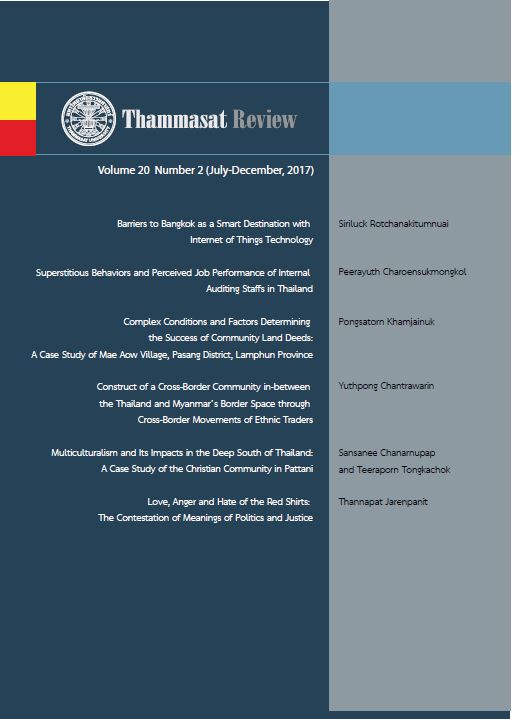Complex Conditions and Factors Determining The Success of Community Land Deeds: A Case Study of Mae Aow Village, Pasang District, Lamphun Province
Keywords:
Community Land Deed, Geo-Ecosystem Factors, Fairness Factors, Production Systems Factors, Community-based ManagementAbstract
Thailand has been facing problems of landlessness, scarcity of land and enclosure of land in forest areas. This has created further problems such as land use conflicts, poverty among smallholder farmers and landless farmers, and ecological degradation. There have been several measures from the government to reallocate some parts of the already destroyed forest to poor villagers, through SPK 4-01. However, farmers still are unable to make decent production and some of them have sold their rights of Land use to outsiders. The most recent measure was the Community Land Title Deed that seemed to be promising and was expected to improve the SPK 4-01 scheme. However, there was skeptical to the effectiveness of this Community Land Deed, and so Mae Aow village was selected as one of the pilot sites to analyze the effectiveness.
This research discovered that the legal aspects of the Community Land Deed were not sufficient. Rather, they needed to have three principles in balance: ecology, equity and sustainable production. The principles must be met as a prerequisite, and then the community would be capable of managing the land and allocating it to the right people accordingly. This research also revealed that land allocation could not guarantee that SPK 4-01 would improve. Judging from the three principles and community management, (1) the ecological aspect was not suitable (2) equity of land allocation was in favor of the rich, and, (3) plots of land were not productive or sustainable. In addition, there would be expectations that this Community Land Deed, for the case study, was more or less similar to SPK 4-01.
Therefore, this research conceptually suggests that the three principles and community management must be further researched, and in practice, the government needs to reconsider the Community Land Deed before launching the program nationwide.
Downloads
Published
How to Cite
Issue
Section
License
The opinions and ideas expressed in all submissions published in Thammasat Review are solely that of the author(s) and do not necessarily reflect that of the editors or the editorial board.
The copyright of all articles including all written content and illustrations belong to Thammasat Review. Any individuals or organisation wishing to publish, reproduce and distribute a particular manuscript must seek permission from the journal first.








